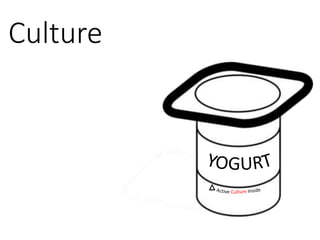
Why Culture is Important
- 1. Culture
- 3. Training, facilitation Leadership development Instructional Design Performance Management Talent Management Employee Engagement Talent Strategy Global Learning, Development, Recruitment, etc… Organization Behaviour Time/greyhairsonmyhead Complexity/size of pay check/progress to takeover the world Culture Strategy People Leadership Business Strategy
- 4. Culture• What is it? • Why is it important? • How is it created? • How can you shape it? • How can you use it to grow your team?
- 5. Death of HR
- 6. The report of my death was an exaggeration
- 14. • Umbrella Term • Party: the vibe, feel, energy of a place • Memory of the organization • Shadow What is Culture?
- 17. You can’t control culture. But you must observe it, and you must be intentional in the decisions that you know will effect it.
- 19. • Umbrella Term • Party: the vibe, feel, energy of a place • Memory of the organization • Shadow What is Culture? • Not controllable • Observable • Make intentional decisions
- 20. Why is Culture important?
- 22. Ever work with someone who doesn’t get it?
- 23. People are a competitive advantage
- 25. Finding a job is about fit
- 27. Seller beware Buyer beware Employer beware Employee beware
- 29. So what does this all mean for you?
- 30. Intentional
- 31. Why is Culture important? • People are a competitive advantage • High performers have their pick of jobs • Employer beware- employees have more power than ever • Be intentional about things that affect culture
- 32. How is culture created?
- 35. Vision
- 36. Values
- 37. 7 +/- 2 Most important Selecting Values Involve others
- 38. Values
- 41. LEADERS “walk the talk”
- 43. Onboarding •Recruitment •Job descriptions •Resume screening •Interviews •Selection •Candidate selection •Offer letters •Negotiations •Welcome Kits •Orientation •Probation •Integrations •First days Maintenance •Policies •Communication •Intranet •Goal setting •Coaching •Training & Development •Performance Reviews •Team Building •Recognition •Rewards •Engagement •Compensation •Employee relations Progression •Performance Plans and Measurement •Dismissals •Succession Planning •Promotions •Retirement What do your rituals say about you?
- 46. Founding story How you treat customers How you treat employees What you do for fun? What rituals are most important? What are people like there? Who gets rewarded? Who fits in? Who gets promoted? Table of Contents
- 55. 1 Observe behaviours Be objective. Use your professional (not personal) opinions. Were expectations set for this type of situation? If not, document and share with entire team. Make sure you document specific examples. Remember to coach for good and bad! 2 Determine cause Status check. Establish supportive climate. Communicate your findings. Frame your feedback, tone and gestures. Solicit their perspective. Listen and show empathy. 3 Communicate Expectations Review expectations. Provide examples of expected performance. Explain the impact of their performance. Link it back to the company VALUES Mutually agree that action is needed. 4 Create plan Create a plan. Include specific observable measurements. Offer support. Decide upon consequences & timeline for follow up. 5 Follow up COACHING FOR PERFORMANCE
- 56. How is culture created? • Vision, values are most important • Espoused theory vs theory in use • Rituals, stories reinforce theory in use • Artifacts – physical environment matters • Consequences are necessary
- 57. How can you shape your culture?
- 61. Recognition 🎂
- 63. Pick habits Ritualize
- 65. BADgood
- 68. . Clarify perspective . Comprehend values . Commit to what is most important . Choose the option that fits best Communicate your decision clearly and honestly
- 69. Hire carefully
- 70. Slowto hire…. ..quick to fire!
- 71. The Pruning Moment! 1) Prune healthy buds or branches that are not the best ones. 2) Prune sick branches that are not going to get well. 3) Prune dead branches that are taking up space needed for the healthy ones to survive.
- 72. How can you shape your culture? • Promote and communicate your vision, values, language regularly • Create some meaningful rituals • Celebrate stories that align with your vision • Use values to make tough decisions • Make personnel decisions carefully
- 73. How can you use culture to grow your team?
- 76. Figure out what you want Job Description Mission for role Deliverables Competencies
- 83. Interview tips
- 84. Don’t give the answer in the question Prepare in advance-know how to score an answer Make sure questions are specific Watch body language Can you spell that for me? Look for ‘we’ vs ‘I’, brevity vs ‘stories’ Interview tips
- 86. Stereotyping Inconsistency in questioning Nonverbal bias Halo/horn effect Contrast effect Similar to me
- 88. How can you use culture to grow your team? • Begin with the end in mind • Be open and honest • Pick fit over skills • Use multiple information sources • Avoid biases
- 89. Culture• What is it? • Why is it important? • How is it created? • How can you shape it? • How can you use it to grow your team?
Notas del editor
- Hello. My name is Phil, and I’m very excited today to be here to talk to you tonight about yogurt. I mean, culture. I’m really excited to be here tonight to talk about culture.
- So, before we get started, I thought we could do some super fast introductions.
- Now, why I am qualified to talk about this stuff?
- It’s the memory of the organization
- It’s your shadow
- Vibe Story Feel “would I want to be here?”
- Vibe Story Feel “would I want to be here?”
- http://www.readcube.com/articles/10.1111%2Fj.1744-6570.2011.01239.x https://hbr.org/2014/11/what-high-performers-want-at-work
- Be as intentional with your culture plan as you are with your business plan. At each point, say- how will this affect the working culture at my company?
- Where you are going
- How you’re going to get there.
